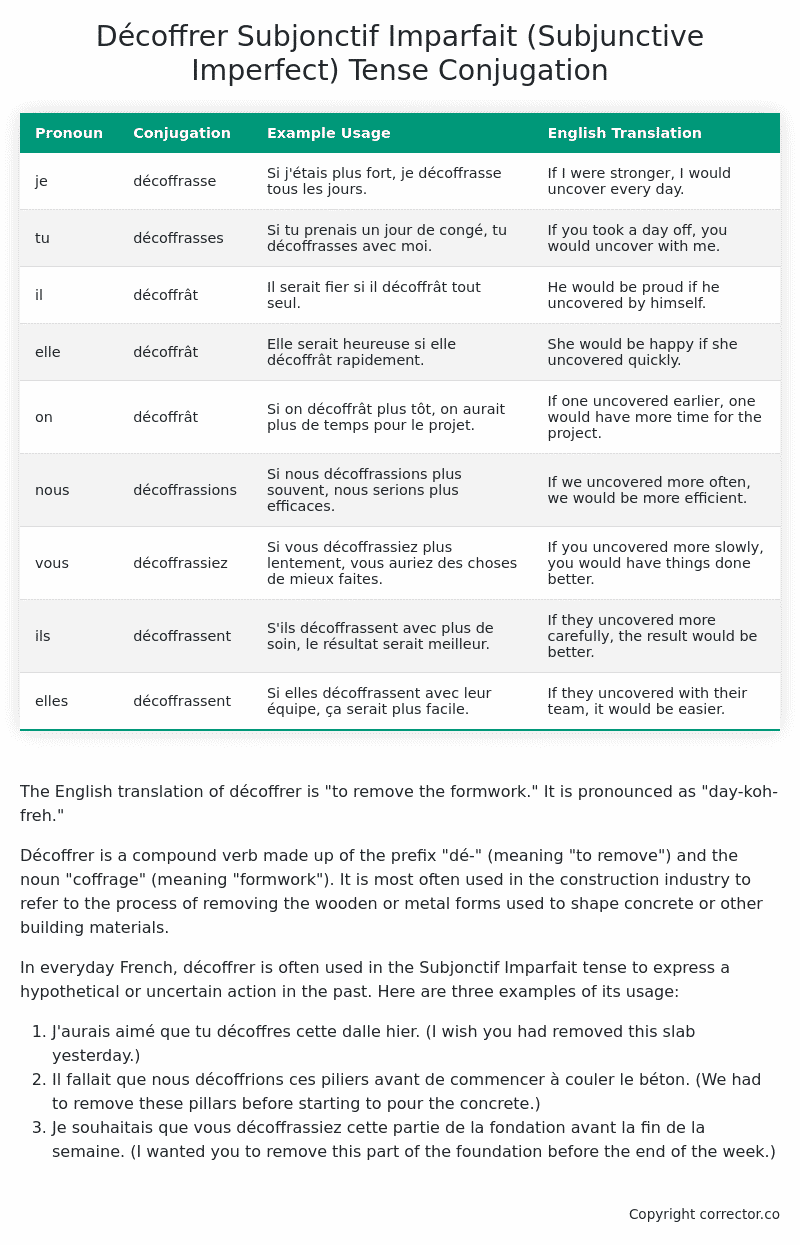Subjonctif Imparfait (Subjunctive Imperfect) Tense Conjugation of the French Verb décoffrer
Introduction to the verb décoffrer
The English translation of décoffrer is “to remove the formwork.” It is pronounced as “day-koh-freh.”
Décoffrer is a compound verb made up of the prefix “dé-” (meaning “to remove”) and the noun “coffrage” (meaning “formwork”). It is most often used in the construction industry to refer to the process of removing the wooden or metal forms used to shape concrete or other building materials.
In everyday French, décoffrer is often used in the Subjonctif Imparfait tense to express a hypothetical or uncertain action in the past. Here are three examples of its usage:
- J’aurais aimé que tu décoffres cette dalle hier. (I wish you had removed this slab yesterday.)
- Il fallait que nous décoffrions ces piliers avant de commencer à couler le béton. (We had to remove these pillars before starting to pour the concrete.)
- Je souhaitais que vous décoffrassiez cette partie de la fondation avant la fin de la semaine. (I wanted you to remove this part of the foundation before the end of the week.)
Table of the Subjonctif Imparfait (Subjunctive Imperfect) Tense Conjugation of décoffrer
| Pronoun | Conjugation | Example Usage | English Translation |
|---|---|---|---|
| je | décoffrasse | Si j’étais plus fort, je décoffrasse tous les jours. | If I were stronger, I would uncover every day. |
| tu | décoffrasses | Si tu prenais un jour de congé, tu décoffrasses avec moi. | If you took a day off, you would uncover with me. |
| il | décoffrât | Il serait fier si il décoffrât tout seul. | He would be proud if he uncovered by himself. |
| elle | décoffrât | Elle serait heureuse si elle décoffrât rapidement. | She would be happy if she uncovered quickly. |
| on | décoffrât | Si on décoffrât plus tôt, on aurait plus de temps pour le projet. | If one uncovered earlier, one would have more time for the project. |
| nous | décoffrassions | Si nous décoffrassions plus souvent, nous serions plus efficaces. | If we uncovered more often, we would be more efficient. |
| vous | décoffrassiez | Si vous décoffrassiez plus lentement, vous auriez des choses de mieux faites. | If you uncovered more slowly, you would have things done better. |
| ils | décoffrassent | S’ils décoffrassent avec plus de soin, le résultat serait meilleur. | If they uncovered more carefully, the result would be better. |
| elles | décoffrassent | Si elles décoffrassent avec leur équipe, ça serait plus facile. | If they uncovered with their team, it would be easier. |
Other Conjugations for Décoffrer.
Le Present (Present Tense) Conjugation of the French Verb décoffrer
Imparfait (Imperfect) Tense Conjugation of the French Verb décoffrer
Passé Simple (Simple Past) Tense Conjugation of the French Verb décoffrer
Passé Composé (Present Perfect) Tense Conjugation of the French Verb décoffrer
Futur Simple (Simple Future) Tense Conjugation of the French Verb décoffrer
Futur Proche (Near Future) Tense Conjugation of the French Verb décoffrer
Plus-que-parfait (Pluperfect) Tense Conjugation of the French Verb décoffrer
Passé Antérieur (Past Anterior) Tense Conjugation of the French Verb décoffrer
Futur Antérieur (Future Anterior) Tense Conjugation of the French Verb décoffrer
Subjonctif Présent (Subjunctive Present) Tense Conjugation of the French Verb décoffrer
Subjonctif Passé (Subjunctive Past) Tense Conjugation of the French Verb décoffrer
Subjonctif Imparfait (Subjunctive Imperfect) Tense Conjugation of the French Verb décoffrer (this article)
Subjonctif Plus-que-parfait (Subjunctive Pluperfect) Tense Conjugation of the French Verb décoffrer
Conditionnel Présent (Conditional Present) Tense Conjugation of the French Verb décoffrer
Conditionnel Passé (Conditional Past) Tense Conjugation of the French Verb décoffrer
L’impératif Présent (Imperative Present) Tense Conjugation of the French Verb décoffrer
L’infinitif Présent (Infinitive Present) Tense Conjugation of the French Verb décoffrer
Struggling with French verbs or the language in general? Why not use our free French Grammar Checker – no registration required!
Get a FREE Download Study Sheet of this Conjugation 🔥
Simply right click the image below, click “save image” and get your free reference for the décoffrer Subjonctif Imparfait tense conjugation!

Décoffrer – About the French Subjonctif Imparfait (Subjunctive Imperfect) Tense
Formation
Common Everyday Usage Patterns
Interactions with Other Tenses
Subjonctif Présent
Indicatif Passé Composé
Conditional
Conditional Perfect
Summary
I hope you enjoyed this article on the verb décoffrer. Still in a learning mood? Check out another TOTALLY random French verb conjugation!


